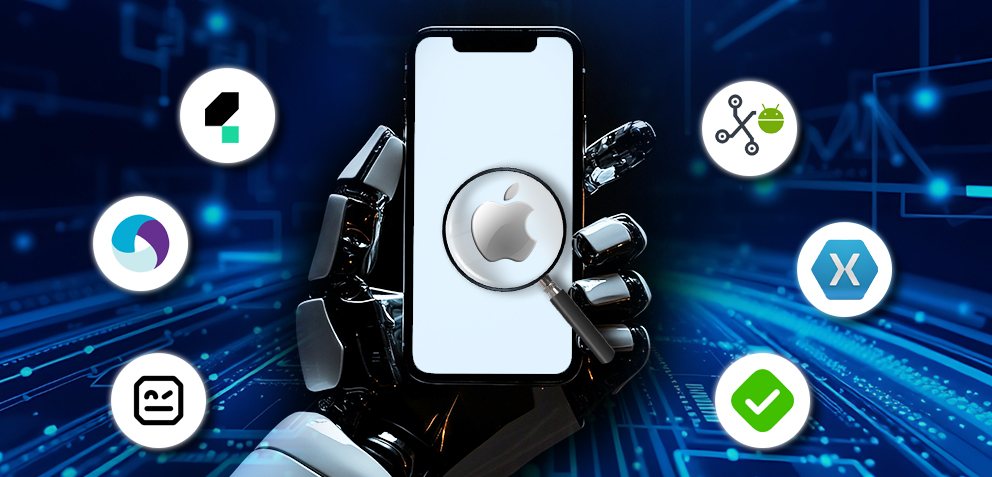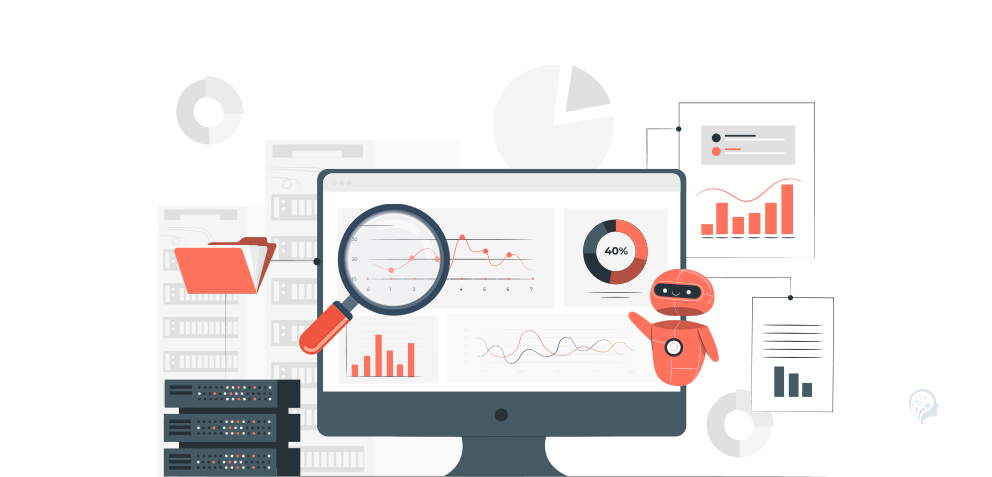Appium vs. Cypress: Which Is The Best Tool For Test Automation?
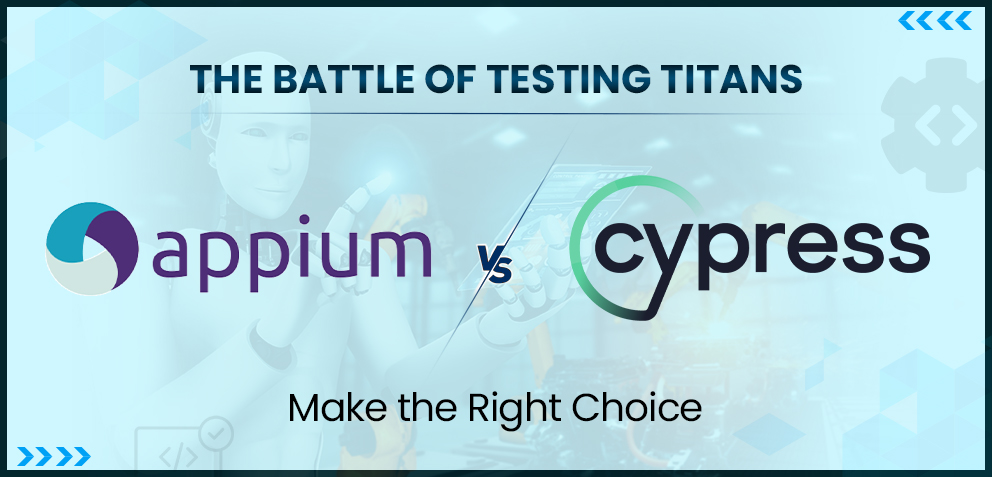
Table Of Contents
 Stay In-the-loop
Stay In-the-loop
Get fresh tech & marketing insights delivered right to your inbox.
Share this Article
Tags
Category
- .Net Developer
- Adtech
- Android App Development
- API
- App Store
- Artificial Intelligence
- Blockchain Development
- Chatbot Development
- CMS Development
- Cybersecurity
- Data Security
- Dedicated Developers
- Digital Marketing
- Ecommerce Development
- Edtech
- Fintech
- Flutter app development
- Full Stack Development
- Healthcare Tech
- Hybrid App Development
- iOS App Development
- IT Project Management
- JavaScript development
- Laravel Development
- Magento Development
- MEAN Stack Developer
- MERN Stack Developer
- Mobile App
- Mobile App Development
- Nodejs Development
- Progressive Web Application
- python development
- QA and testing
- Quality Engineering
- React Native
- SaaS
- SEO
- Shopify Development
- Software Development
- Software Outsourcing
- Staff Augmentation
- UI/UX Development
- Web analytics tools
- Wordpress Development
The rise of new-age applications and ongoing competitions makes it extremely crucial for apps to up-to-date and provide top-notch quality. To ensure that, organizations must meticulously test the apps before every release.
Having said that, manual testing can be time-consuming and that’s where automation testing jumps in. And various automation tools like Appium, Cypress, etc can provide effective results.
This article dives deep into the world of Appium and Cypress, discovering whing reigns supreme. So, without further ado, let’s begin!
Appium vs. Cypress: An Overview
Opting for the right automation tools is a must for your software top-tier quality. That said, you need to have proper understanding of how Appium or Cypress function, their comprehensive comparison, and defining the use cases. Let’s have a look at their basics.
Cypress
Cypress is an automation tool which has an end-to-end testing framework written in JavaScript. It is known for its ease in writing and executing the test cases in real time. Cypress does not support mobile applications and allows only to test web applications generating HTML.
Key Features of Cypress
- Javascript: It supports Javascript in leveraging modern capabilities that enhance the testers’ and developers’ capability to provide robust solutions through comprehensive testing.
- Real Time Testing: One of the standout features of cypress that help tester’s and developer’s to transform the testing experience efficiently by providing instant feedback and visual insights.
- Built-in Debugging Tools: This feature helps to enhance the testing experience by providing detailed logs and visual insights which eventually helps to excel the quality of the application.
- Seamless Framework Integration: Cypress supports popular frameworks with a smooth setup, which helps implement the testing process effectively and quickly.
- Time Travel Debugging: Cypress captures the snapshots of the application which helps the user to navigate through the test execution history by hovering over each command.
Use Cases of Cypress
Cypress is widely used for automating extensive and complex web applications. This is where Cypress excels:
- End-to-End Testing: Cypress provides the option to test the entire application workflow from start to finish, simulating real time scenarios which helps to ensure that the functionalities are working as expected.
- Integration Testing: We can test if the various components of the application are working together as expected to be.
- Regression Testing: Cypress helps in creating regression suits to make sure the existing functionalities are working seamlessly even after the code changes.
- API Testing: We can achieve API automation using Cypress
- Dynamic Content Update: Cypress helps the user’s validate dynamic content updates without page reloads, checking APIs and testing complex routing scenarios.
Increase Test Coverage & Get Consistent & Reliable Results With Our Cutting-Edge Automation Testing Services!
Appium
However, Appium is an open-source automation testing tool used for mobile web, native, cross-platform or hybrid applications based on Selenium. It is scripted in Node.js and supports multiple programming languages like Java, Python, Ruby, PHP, C#, JavaScript or any language that supports selenium.
Key Features of Appium
The prime features of Appium are mentioned below:
- Supports various Mobile platforms:Appium automates all apps built in IOS or Android.
- Supports Multiple Programming languages: Appium supports multiple languages like Java, Javascript, Python, perl and PHP.
- Native App and Hybrid App Testing: Appium can automate tests for both native and hybrid mobile applications.
- Open Source Tool: This open-source tool enable users to use it for free.
- Real Device and Emulator Testing: Allows testing on real mobile devices or emulators depending on your needs
Use Cases of Appium
This is a robust test automation tool due to its versatility for mobile app testing. It’s use cases includes:
- Functional Testing: Extensively used to test the core functionality of the mobile apps.
- Regression Testing: Appium helps in creating regression suits to make sure the existing functionalities are working seamlessly even after the code changes.
- UI Testing: It can seamlessly and quickly verify the mobile apps’ user interface and user experience, ensuring flawless and intuitive user experience.
- Cross-Platform Testing: Appium uses single codebase to automate tests in several mobile platforms.
- Hybrid App Testing: Appium can automate test for apps that amalagamates both native and web technologies.
How Can You Start With Cypress?
Believe it or not, the first step of Cypress is smooth and effortless. Here’s the prerequisite you need to keep in the mind:
- Node.js and npm (Version 10 or later) – Node Package Manager (NPM) is a default package manager for node.js, which allows to installing, updating of Javascript packages.
- Javascript environment – It includes runtime, javascript libraries needed for the development and execution of the Javascript applications.
- Code editor (Visual Studio code is recommended) – An application which allows users to maintain quality of written codes.
- Cypress runner – It is an interface that allows users to manage their end to end test.
RELATED READ: Maximize QA Efficiency with the Power of Automation Testing
Write Your First Test Case in Cypress
Now, we will show you a primary test to validate a simple web page element.
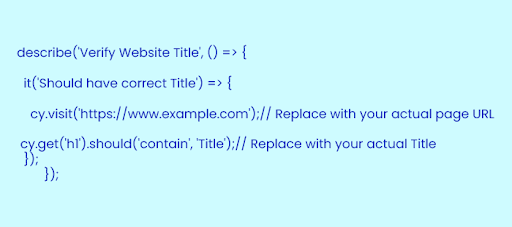
Explanation:
- describe: Groups related tests scenarios focused on a specific functionality.
- it: Defines a specific test case to run independently, without interference from other tests.
- cy.visit: Navigates the browser to the specified URL.
- cy.title: Retrieves the current web page title.
- should: Makes an assertion about the retrieved title.
- contain: Verifies if the title contains the expected value.
Steps to Run the Above Codes:
- Open terminal from the code editor
- Type npx cypress open to open the cypress user interface
- Click the “test.spec.js” file to execute the specific test case
- To run the test cases in Non GUI , navigate to your cypress project directory and select the desired file to execute.
- Type npx cypress run and press enter.
Secure, Streamline, & Optimize Your APIs With Magicminds’ Robust API Testing Services!
How Can You Start With Appium?
Appium supports robust mobile app automation testing in diverse platforms, nevertheless, it needs more detailed setup than Cypress. Here’s the breakdown to start with Appium:
- Node and npm (Version 10+): Ensure you have a recent version to get all the features.
- Appium Server: Do download the Appium server from the official Appium website – (https://appium.io/docs/en/2.0/quickstart/install/). This is for different operating systems like Windows, macOS, and Linux.
- Java development kit (JDK) or Java SE version 8 or above: It includes the Java Runtime Environment (JRE), compilers, and tools for building and debugging Java applications.
- Code Editor: Editor helps in maintaining the code quality and offers some great features for the debugging process.
- Real Smartphone or Smartphone Emulator: You definitely require a real mobile device or an emulator to run the Appium tests. For Android development, you can go ahead with the Android SDK emulator. And for iOS development, a Mac computer with Xcode and real iOS device or emulator is your green signal for the Appium tests.
READ MORE: Mastering Test Automation Tool Selection: What Matters the Most?
Write Your First Test Case in Appium
Let’s build a simple Appium test in Java to detect if a particular element exists on the launched app.
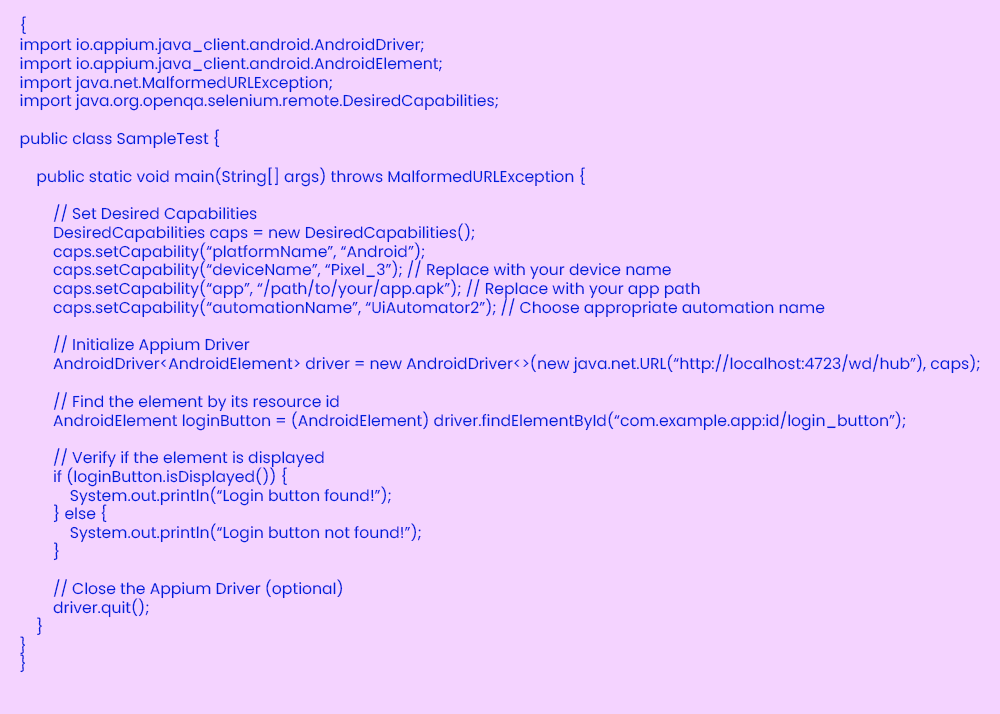
Explanation:
- Import necessary Appium Java client libraries.
- DesiredCapabilities object defines the capabilities of the device and app under test.
- We set values for platformName, deviceName, app, and automationName.
- An AndroidDriver instance is created to interact with the mobile device.
- We find the element with the specified resource id using findElementById.
- We check if the element is displayed using the isDisplayed method.
- Finally, we close the Appium driver (optional).
Steps to Run the Above Codes:
- Appium Server: Ensure your Appium server is running on port 4723 (default) or your designated port.
- Compile the Test: Compile the SampleTest.java file using a Java compiler (e.g., javac SampleTest.java).
- Run the Test: Navigate to the directory containing the compiled class file (SampleTest.class) and execute the following command:
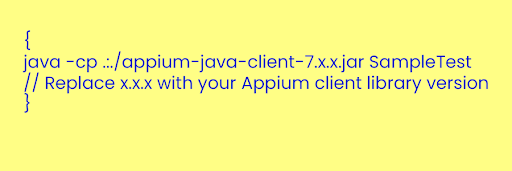
ALSO READ: Embrace AI for Superior Mobile App Security Testing Solutions
A Brief Comparison Between Cypress and Appium
Appium and Cypress both are advanced and effective automation testing tool. However, Appium is slightly complex to setup and Cypress is perfect for web automation. Both of these tools are open-source and community-driven, but differ from each other in many aspects. Let’s take a look at those differences:
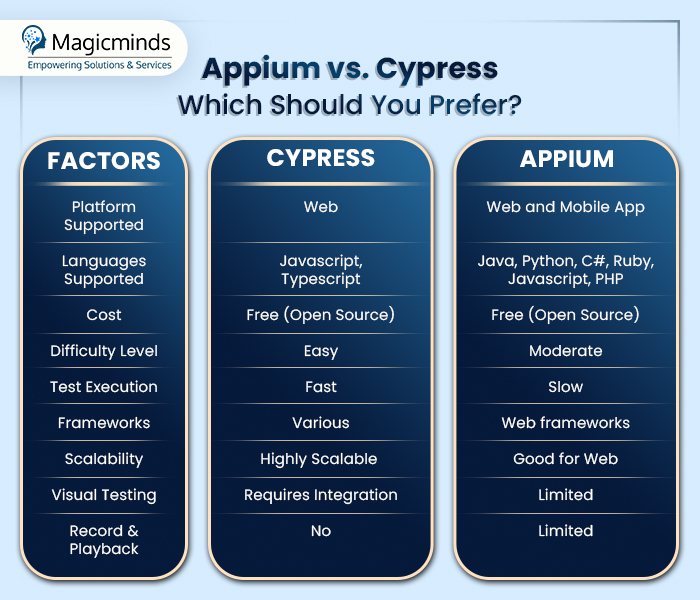
Don’t Let Bugs Ruin Your User Experience; Get Highest Software Quality With Magicminds’ Manual Testing Service!
Know More!Appium vs. Cypress: Which Reigns Supreme?
Well there is no “one-size-fit-all” kinda formula to detect which tool is better than the other. It entirely depend on your project to determine which tool is suitable. Cypress will stand out in automating web applications, especially for the teams who have the experience in Javascript but when it comes to automating mobile apps then Appium is the best automation tool available in the market. So, understand your project requirements first and choose the tool accordingly.
However, having an automation testing service provider for your orgnazations helps you get edge of it. How? Well the experts can utlize Appium or Cypress that best fit your project and offer you with a superior software quality.
Having said that, this is your chance to partner with Magicminds. We are a pioneer in software development and testing department, helping you with manual testing, automation testing and more. Our QA experts meticulously understand your project goals and choose the best automation tool as per that – whether it’s Appium or Cypress.
So, don’t miss out your chance on that. Get in touch with us and let us ensure a top-class software quality exclusively for you! Contact Us!
The rise of new-age applications and ongoing competitions makes it extremely crucial for apps to up-to-date and provide top-notch quality. To ensure that, organizations must meticulously test the apps before every release. Having said that, manual testing can be time-consuming and that’s where automation testing jumps in. And various automation tools like Appium, Cypress, etc can provide effective results. This article dives deep into the world of Appium and Cypress, discovering whing reigns supreme. So, without further ado, let’s begin!
| Table of Contents!
Appium vs. Cypress: An Overview
How Can You Start With Cypress?
How Can You Start With Appium?
A Brief Comparison Between Cypress and Appium
Appium vs. Cypress: Which Reigns Supreme? |
Appium vs. Cypress: An Overview
Opting for the right automation tools is a must for your software top-tier quality. That said, you need to have proper understanding of how Appium or Cypress function, their comprehensive comparison, and defining the use cases. Let’s have a look at their basics.
Cypress
Cypress is an automation tool which has an end-to-end testing framework written in JavaScript. It is known for its ease in writing and executing the test cases in real time. Cypress does not support mobile applications and allows only to test web applications generating HTML.
Key Features of Cypress
- Javascript: It supports Javascript in leveraging modern capabilities that enhance the testers’ and developers’ capability to provide robust solutions through comprehensive testing.
- Real Time Testing: One of the standout features of cypress that help tester’s and developer’s to transform the testing experience efficiently by providing instant feedback and visual insights.
- Built-in Debugging Tools: This feature helps to enhance the testing experience by providing detailed logs and visual insights which eventually helps to excel the quality of the application.
- Seamless Framework Integration: Cypress supports popular frameworks with a smooth setup, which helps implement the testing process effectively and quickly.
- Time Travel Debugging: Cypress captures the snapshots of the application which helps the user to navigate through the test execution history by hovering over each command.
Use Cases of Cypress
Cypress is widely used for automating extensive and complex web applications. This is where Cypress excels:
- End-to-End Testing: Cypress provides the option to test the entire application workflow from start to finish, simulating real time scenarios which helps to ensure that the functionalities are working as expected.
- Integration Testing: We can test if the various components of the application are working together as expected to be.
- Regression Testing: Cypress helps in creating regression suits to make sure the existing functionalities are working seamlessly even after the code changes.
- API Testing: We can achieve API automation using Cypress
- Dynamic Content Update: Cypress helps the user’s validate dynamic content updates without page reloads, checking APIs and testing complex routing scenarios.
| Increase Test Coverage & Get Consistent & Reliable Results With Our Cutting-Edge Automation Testing Services! Share Your Project Requirements! |
Appium
However, Appium is an open-source automation testing tool used for mobile web, native, cross-platform or hybrid applications based on Selenium. It is scripted in Node.js and supports multiple programming languages like Java, Python, Ruby, PHP, C#, JavaScript or any language that supports selenium.
Key Features of Appium
The prime features of Appium are mentioned below:
- Supports various Mobile platforms:Appium automates all apps built in IOS or Android.
- Supports Multiple Programming languages: Appium supports multiple languages like Java, Javascript, Python, perl and PHP.
- Native App and Hybrid App Testing: Appium can automate tests for both native and hybrid mobile applications.
- Open Source Tool: This open-source tool enable users to use it for free.
- Real Device and Emulator Testing: Allows testing on real mobile devices or emulators depending on your needs
Use Cases of Appium
This is a robust test automation tool due to its versatility for mobile app testing. It’s use cases includes:
- Functional Testing: Extensively used to test the core functionality of the mobile apps.
- Regression Testing: Appium helps in creating regression suits to make sure the existing functionalities are working seamlessly even after the code changes.
- UI Testing: It can seamlessly and quickly verify the mobile apps’ user interface and user experience, ensuring flawless and intuitive user experience.
- Cross-Platform Testing: Appium uses single codebase to automate tests in several mobile platforms.
- Hybrid App Testing: Appium can automate test for apps that amalagamates both native and web technologies.
How Can You Start With Cypress?
Believe it or not, the first step of Cypress is smooth and effortless. Here’s the prerequisite you need to keep in the mind:
- Node.js and npm (Version 10 or later) – Node Package Manager (NPM) is a default package manager for node.js, which allows to installing, updating of Javascript packages.
- Javascript environment – It includes runtime, javascript libraries needed for the development and execution of the Javascript applications.
3.Code editor (Visual Studio code is recommended) – An application which allows users to maintain quality of written codes.
- Cypress runner – It is an interface that allows users to manage their end to end test.
RELATED READ: Maximize QA Efficiency with the Power of Automation Testing
Write Your First Test Case in Cypress
Now, we will show you a primary test to validate a simple web page element.
| describe(‘Verify Website Title’, () => {
it(‘Should have correct Title’) => { cy.visit(‘https://www.example.com’);// Replace with your actual page URL
cy.get(‘h1’).should(‘contain’, ‘Title’);// Replace with your actual Title }); }); |
Explanation:
- describe: Groups related tests scenarios focused on a specific functionality.
- it: Defines a specific test case to run independently, without interference from other tests.
- cy.visit: Navigates the browser to the specified URL.
- cy.title: Retrieves the current web page title.
- should: Makes an assertion about the retrieved title.
- contain: Verifies if the title contains the expected value.
Steps to Run the Above Codes:
- Open terminal from the code editor
- Type npx cypress open to open the cypress user interface
- Click the “test.spec.js” file to execute the specific test case
- To run the test cases in Non GUI , navigate to your cypress project directory and select the desired file to execute.
- Type npx cypress run and press enter.
| Secure, Streamline, & Optimize Your APIs With Magicminds’ Robust API Testing Services! Book a Free Consultation! |
How Can You Start With Appium?
Appium supports robust mobile app automation testing in diverse platforms, nevertheless, it needs more detailed setup than Cypress. Here’s the breakdown to start with Appium:
- Node and npm (Version 10+): Ensure you have a recent version to get all the features.
- Appium Server: Do download the Appium server from the official Appium website – (https://appium.io/docs/en/2.0/quickstart/install/). This is for different operating systems like Windows, macOS, and Linux.
- Java development kit (JDK) or Java SE version 8 or above: It includes the Java Runtime Environment (JRE), compilers, and tools for building and debugging Java applications.
- Code Editor: Editor helps in maintaining the code quality and offers some great features for the debugging process.
- Real Smartphone or Smartphone Emulator: You definitely require a real mobile device or an emulator to run the Appium tests. For Android development, you can go ahead with the Android SDK emulator. And for iOS development, a Mac computer with Xcode and real iOS device or emulator is your green signal for the Appium tests.
READ MORE: Mastering Test Automation Tool Selection: What Matters the Most?
Write Your First Test Case in Appium
Let’s build a simple Appium test in Java to detect if a particular element exists on the launched app.
Explanation:
- Import necessary Appium Java client libraries.
- DesiredCapabilities object defines the capabilities of the device and app under test.
- We set values for platformName, deviceName, app, and automationName.
- An AndroidDriver instance is created to interact with the mobile device.
- We find the element with the specified resource id using findElementById.
- We check if the element is displayed using the isDisplayed method.
- Finally, we close the Appium driver (optional).
Steps to Run the Above Codes:
- Appium Server: Ensure your Appium server is running on port 4723 (default) or your designated port.
- Compile the Test: Compile the SampleTest.java file using a Java compiler (e.g., javac SampleTest.java).
- Run the Test: Navigate to the directory containing the compiled class file (SampleTest.class) and execute the following command:
| {
java -cp .:./appium-java-client-7.x.x.jar SampleTest // Replace x.x.x with your Appium client library version } |
ALSO READ: Embrace AI for Superior Mobile App Security Testing Solutions
A Brief Comparison Between Cypress and Appium
Appium and Cypress both are advanced and effective automation testing tool. However, Appium is slightly complex to setup and Cypress is perfect for web automation. Both of these tools are open-source and community-driven, but differ from each other in many aspects. Let’s take a look at those differences:
| Factors | Cypress | Appium |
| Platform Supported | Web | Web and Mobile App |
| Languages Supported | Javascript, Typescript | Java, Python, C#, Ruby, Javascript, PHP |
| Cost | Free (Open Source) | Free (Open Source) |
| Difficulty Level | Easy | Moderate |
| Test Execution | Fast | Slow |
| Frameworks | Various | Web frameworks |
| Scalability | Highly Scalable | Good for Web |
| Visual Testing | Requires Integration | Limited |
| Record & Playback | No | Limited |
| Don’t Let Bugs Ruin Your User Experience; Get Highest Software Quality With Magicminds’ Manual Testing Service! Know More |
Appium vs. Cypress: Which Reigns Supreme?
Well there is no “one-size-fit-all” kinda formula to detect which tool is better than the other. It entirely depend on your project to determine which tool is suitable. Cypress will stand out in automating web applications, especially for the teams who have the experience in Javascript but when it comes to automating mobile apps then Appium is the best automation tool available in the market. So, understand your project requirements first and choose the tool accordingly.
However, having an automation testing service provider for your orgnazations helps you get edge of it. How? Well the experts can utlize Appium or Cypress that best fit your project and offer you with a superior software quality.
Having said that, this is your chance to partner with Magicminds. We are a pioneer in software development and testing department, helping you with manual testing, automation testing and more. Our QA experts meticulously understand your project goals and choose the best automation tool as per that – whether it’s Appium or Cypress.
So, don’t miss out your chance on that. Get in touch with us and let us ensure a top-class software quality exclusively for you! Contact Us!
